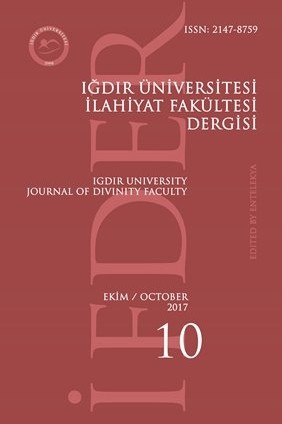İlk Dönem Fütüvvetnâmelerine Göre Ahîliğin İtikâdî Temelleri
Ahîlik teşkilatı, Abbasi Halifesi en-Nasır li-Dinillah’ın kurduğu fütüvvet teşkilatının geliştirilerek Türk toplumuna uyarlanmış bir devamı niteliğindedir. Fütüvvet teşkilatın usul, adap ve erkânını tespit etmek amacıyla Fütüvvetnâmeler kaleme alınmıştır. Bu esasları temellendirme anlamında sıkça ayet ve hadislere müracaat edilmiştir. Ahîliğin, ahlaki ve eğitimsel ilkelerini ve temel kurallarını Fütüvvet teşkilatından aldığı kabul edildiğinde Ahîliğin itikâdî temellerinin tesbitinde Fütüvvetnâmeler büyük önem arzetmektedir. Çalışmamızda Fütüvvetnâmelerden yola çıkarak Ahîliğin ahlaki yapısının itikâdî temelleri tespit edilerek İslam inanç esaslarının Ahîliğin ahlaki boyutuna etkileri ortaya konulacaktır. Fütüvvetin temel amacı Allah’ın rızasını kazanmaktır. Kişiye Allah’ın rızasını kazandıracak ve onu ebedi saadete ulaştıracak ameller ve ahlaki davranışlar Fütüvvetnâmelerin ana temasıdır. İslam inanç esasları Fütüvvetnâmelerde bu ana tema çerçevesinde yorumlanmıştır.
Anahtar Kelimeler:
Fütüvvet, fütüvvetname, ahîlik, itikad, mezhep.
Faith Basis of the Akhi-Order According to Early Futuwwatnamahs
The Akhi community can be defined as an continuation of the Futuwwah organization established by the Abbasid Caliph en-Nasır li-Dinillah (1180-1225) that has been adopted to the Turkish society. Futuwwatnamahs were produced in order to make the organization’s styles, manners and procedures. Quranic verses and hadiths were heavily used in the futuwwatnamahs. Given that the Akhi organization is based on the Futuwwah organization in terms of ethical and educational principles, futuwwatnamahs provide invaluable sources to identify the faith basis of the Akhi organization. In this study, the faith basis of the Akhi organization will be revealed based on futuwwatnamahs, and the effects of Islamic faith on the ethical patterns of the Akhi organization will be uncovered. The major goal of futuwwat is to gain the consent of Allah. Those actions and ethical behavior leading to this consent are among major topics of the futuwwatnamahs. The principles of Islamic faith are interpreted within this context in futuwwatnamahs.
Keywords:
Futuwwah, futuwwatnamah, akhism, belief, sect.,
- ISSN: 2147-8759
- Başlangıç: 2013
- Yayıncı: Iğdır Üniversitesi
Sayıdaki Diğer Makaleler
Kitap Tanıtım ve Değerlendirme
Velilerin Lise Din Kültürü ve Ahlak Bilgisi Dersi Programına Yönelik Tutum Ölçeği
Hadis İlminin Endülüs'e Girişi
Kur’an-ı Kerim, çev. Ziya Bünyadov & Vasim Memmedaliyev
İlk Dönem Fütüvvetnâmelerine Göre Ahîliğin İtikâdî Temelleri
Ahmed b. Hanbel'in 'Müsned' Adlı Eseri Üzerine Bazı Mülahazalar
Toplumsal Kalkınmada Bilginin ve Kültürün İmkânları Boyutunun İncelenmesi
